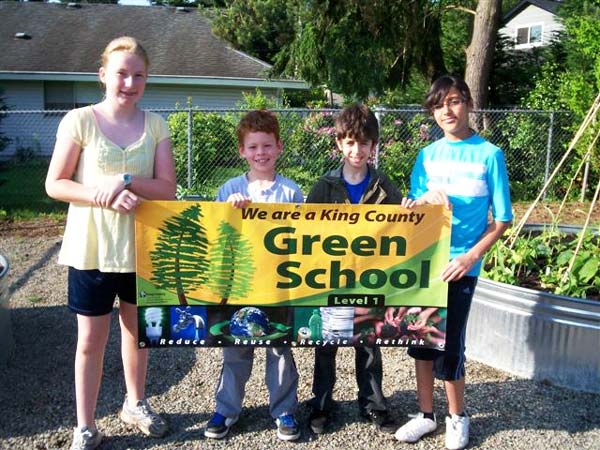Success story: Sherwood Forest Elementary School
School District: Bellevue
School Location: Bellevue
Began participating in the Green Schools Program: September
2008
Level One of the Green Schools Program: Achieved in June 2009
Level Two of the Green Schools Program: Achieved in May 2010
Level Three of the Green Schools Program: Achieved in April 2011
Waste reduction and recycling
- In the 2009-10 school year, the school began to collect food scraps and other compostable materials in the cafeteria at breakfast and lunch.
- Students placed recycling containers in all classrooms, offices, work spaces and common areas. On each recycling container, the students placed a recycling sticker that lists in English and Spanish what can and can’t be recycled. The City of Bellevue, which partnered with the Green Schools Program to provide recycling assistance to Bellevue schools, provided the recycling containers and bilingual stickers.

- Students created a large bulletin board display near the cafeteria that included samples of items that can be recycled at the school.
- Students introduced a new program in the cafeteria in which students emptied their milk cartons before placing the empty carton in the recycling container. Pictures of items that can be recycled were posted on the recycling containers.
- Student helper teams were established to empty classroom recycling containers daily.
- The school began to recycle batteries, cell phones and old printer cartridges. Refurbished printer cartridges are purchased.
- Recycled content paper is purchased for all types of paper used at the school.
- Durable dishes, cups, glassware, metal silverware and tablecloths were purchased to replace disposable products in the staff room.
- Paper used on one side is allocated as scrap paper for memos and notes.
- The students designed a Green Week that focused on raising awareness of the importance of waste reduction and recycling.
- Students patrolled hallways and the playground for litter and collected paper for recycling.
- Students learned and played environmental and recycling games during physical education classes and recess.
- All students attended an assembly program that encourages waste reduction, reuse and recycling.
- Cafeteria supervisors remind students to “only take what they can eat.”
- Unused and unopened food items are collected on a table in the cafeteria for sharing.
- Lunch trays are stacked to increase garbage container capacity and to reduce frequency of pick-up.
- To reduce paper use, staff communication is almost entirely handled via e-mail, and smart boards are used in classrooms.
- During the 2010-11 school year, a guest speaker from the City of Bellevue announced what is compostable, recyclable and garbage in the cafeteria.
- Students and staff increased their recycling rate from 43 percent to 53 percent.
- The school reduced garbage from 16 cubic yards per week to eight cubic yards per week.
- To educate students and staff on what is and is not recyclable, the school signed up for a waste reduction and recycling assembly.
- Two third grade classes participated in a recycling basics workshop.
Environmental education
- The student Green Team researched conservation information, and made posters and displays to educate the school community about composting and energy conservation.
- The third grade participated in a classroom recycling workshop.
- The fourth grade raised salmon and released them into the wild.
- The fifth grade learned about watersheds.
- Conservation topics were mentioned in several school-wide assemblies in which cooperation and individual responsibility were emphasized.
- Green Team members monitored the collection of compostable materials during lunch and helped fellow students to correctly sort garbage, recyclable and compostable materials.
- Environmental and conservation information was shared in the PTSA newsletter.
- The school created raised beds and planted an edible garden.
- Rain barrels were installed and the collected rainwater is used to water the gardens.
- During Green Week in April 2011, the school promoted resource conservation.
Energy conservation
- Students created and led an energy patrol to help reduce energy use.
- During Earth Week the students focused on a different energy conservation practice each day.
- Window blinds are closed at end of each day to increase insulation.
- The school posted reminders to turn off lights.
- Lights were turned off in unoccupied rooms or when sufficient daylight was present.
- Electrical fixtures were dusted to improve efficiency.
- All rooms have motion sensors for lights and multiple switches for light levels.
- After-school activities are centralized in common areas.
Water conservation
- The student green team created large posters with pictures and a rhyme, including the phrase: “1 flush is enough, 2 pumps for soap” to encourage reducing use of paper towels, soap and water.
- Students participated in the City of Bellevue’s “poo-lution” workshop and campaign regarding water quality.
- The student green team researched information and, for 10 mornings, announced conservation tips during morning schoolwide announcements. The students also wrote and performed a conservation chant and song for the morning announcements.
- Staff organized a class field trip to the Cedar River watershed.
- The green team organized a pledge campaign for students to pledge to use less water at home and at school.
- Fourth graders used the City of Bellevue’s water conservation curriculum materials, and the green team used the water conservation resource tub from the City of Bellevue.
- The green team shared information about the school’s water use via newsletters, email and announcements.
- Students placed “turn water off” stickers by sinks throughout the school.
For more information about the school’s conservation achievements and participation in the Green Schools Program, contact:
Sherwood Forest Elementary School
425-456-5700


 Translate
Translate
